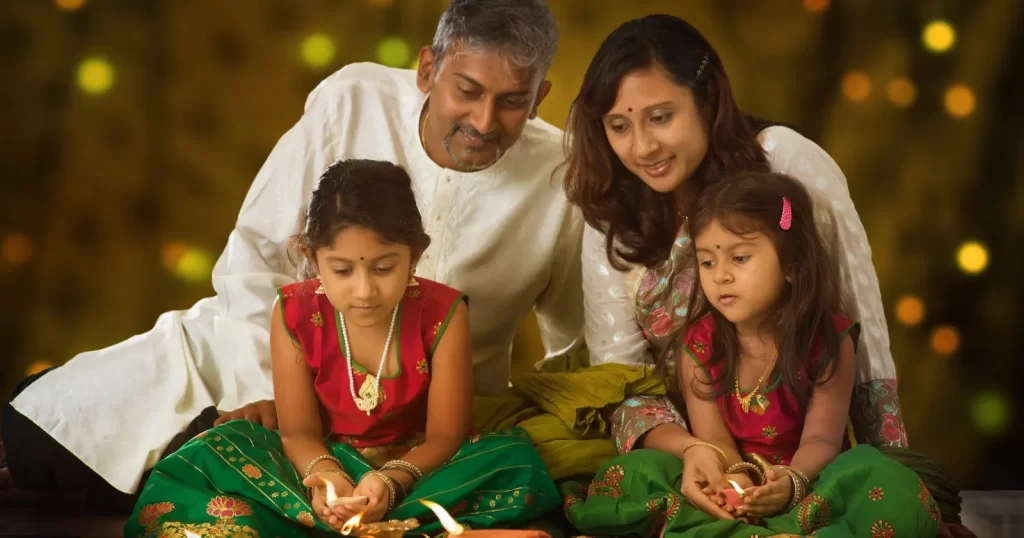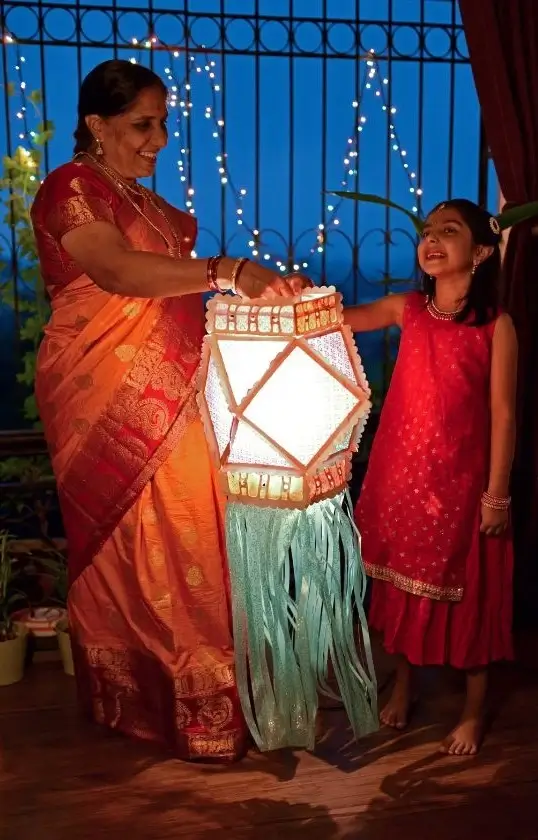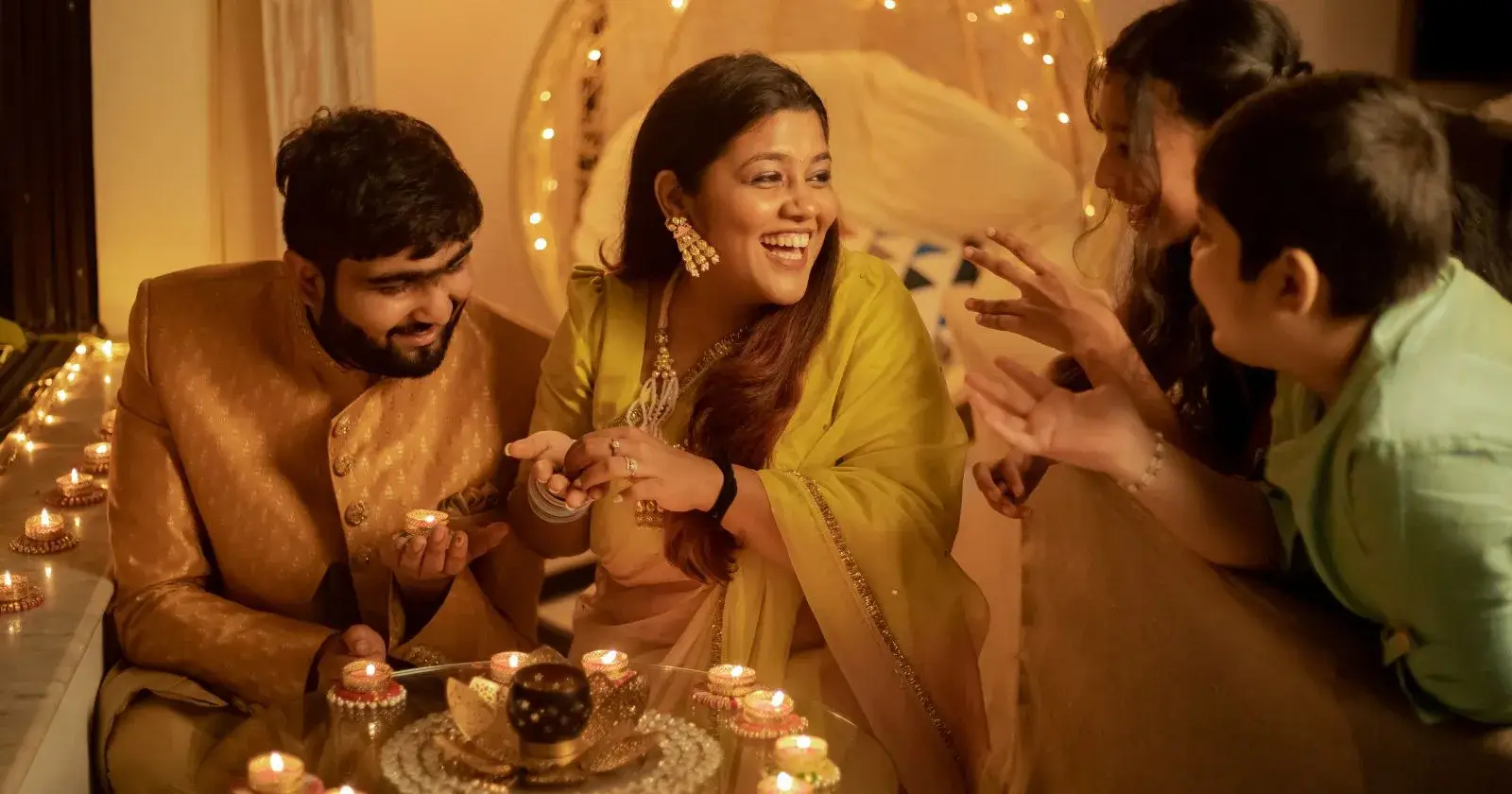Diwali, the Festival of Lights, is more than just a celebration; it’s a treasure chest of stories, traditions, and values that have been passed down through generations. As a child, I remember being captivated by the tales my grandmother would narrate about the victory of light over darkness, the return of Lord Rama, and the significance of each ritual. Today, as a parent, I find myself in her shoes, eager to pass on these traditions and values to the next generation, which is why Diwali holds an extra special place in my heart now.
I still remember the year my young daughter, with wide-eyed wonder, asked me about the significance of the tiny lamps we light. “Mumma, why do we light these?” she asked. As I explained their role as our “tiny, glowing superheroes” that chase away darkness, her excitement was infectious.
Involving children in such celebrations makes festivals even more special while teaching them important values.
Here’s how we can celebrate Diwali with our kids in meaningful and enjoyable ways, for them and for us parents.
The Cultural Significance of Diwali
Diwali isn’t just a day of festivity; it’s deeply rooted in our culture and history. The tales associated with Diwali, whether it’s the return of Lord Rama to Ayodhya or the worship of Goddess Lakshmi, are not just stories but lessons in righteousness, bravery, and devotion. By celebrating Diwali, we pass on these tales and the values they represent to our children, ensuring that our rich cultural heritage continues to thrive.

Values Learned from Diwali
What better time to impart wisdom to our children than during Diwali? Here are key lessons that we share with our kids as we involve them in the celebrations.
- Triumph of Good Over Evil: At its core, Diwali celebrates the victory of good over evil. It’s an opportunity to teach children about moral values, righteousness, and the importance of making the right choices.
- Gratitude and Reflection: The festival is a time to be thankful for our blessings and reflect on our actions. It instils in children the value of gratitude and self-reflection.
- Unity: Diwali is a time of celebration that brings families and communities together. It teaches children the importance of unity, love, and the joy of celebrating as one.

The Science Behind Diwali Traditions
Did you know that the materials used in making rangoli have a scientific basis? They are believed to keep harmful insects away, ensuring a clean environment. When children engage in rangoli-making, they’re not just indulging in art; they’re also learning about the environment.
Similarly, the tradition of lighting oil lamps has a dual purpose, rooted in science. Apart from symbolising the victory of light over darkness, it also purifies the air. Teaching children about this can instil in them a respect for traditions that have both cultural and scientific significance.
How to Celebrate Diwali with Little Kids?
Since Diwali is a beloved Indian festival that many children are familiar with, their excitement levels are already at high levels (also, which kid doesn’t love holidays from school!). This makes it much easier for us, as parents, to get them involved in several activities, because they’re already primed for participation.
- Rangoli Art: Engage your children in creating colourful rangolis at the entrance of your home. It’s not just an artistic expression but also a lesson in symmetry, patterns, and teamwork.
- Crafting Diyas: Let their creativity shine by decorating earthen lamps or diyas. As they paint and adorn these lamps, narrate to them the story of how Lord Rama was welcomed back to Ayodhya with a trail of lit diyas.
- Storytelling Sessions: Share tales from the Ramayana, explaining the significance of each character and event. It’s a wonderful way to impart values and lessons from our rich heritage.
- Responsibility with Deep Cleaning: Assign small cleaning tasks to your children. It instils a sense of responsibility and teaches them the importance of a clean and hygienic environment.
- Understanding Value with Gifts: Diwali is also a time for giving and sharing. Involve your children in selecting gifts for family and friends, teaching them the joy of giving and the value of thoughtfulness. Donating toys and gifts to the underprivileged is also a key part of Diwali celebrations. By involving children in small acts of charity, they learn the value of kindness towards others who aren’t as privileged as they are.
- Safety First with Fireworks: While fireworks are a significant part of the celebrations, it’s essential to teach children about safety. It’s an opportunity to teach them about responsibility and the consequences of their actions.

How to Make Diwali Fun for Kids?
1. Deep Cleaning Together
Diwali is synonymous with cleaning every nook and corner of the house. Involve your children in the process, teaching them the importance of cleanliness and organisation. How about you involve them in making your house cleaning strategy and plan of action? This will exercise their planning skills and there is no better team than a parent-child tag team.
2. Putting up Lights Together
When the cleaning is all done and your home is now ready for the festive decorations, get your kids involved. It helps to keep them busy, ergo out of mischief and keeps them engaged, allowing them to explore their creativity while reassuring them of their role in the festivities. Get them to lay out the flowers, select or set the rangoli design patterns, help you put up the fairy lights and so on.

3. Sweet Delights
Every region in India has its special Diwali delicacy. From the ‘Shankarpali’ in Maharashtra to the ‘Pinni’ in Punjab, the festival is a gastronomic delight. Cooking these traditional recipes with your children can be a journey through India’s diverse culinary landscape. It’s also a chance to teach them about the importance of food in cultural celebrations. So, involve them in making these traditional sweets. As you roll out the dough for ‘gujiyas’ or shape the ‘laddoos’, share stories of your childhood Diwali celebrations.
4. Eco-Friendly Celebrations
Teach them the importance of an eco-friendly Diwali. Opt for clay diyas over plastic lights, and natural colours for rangoli. How about a DIY Lantern that you can make from scratch? In today’s age, where environmental conservation is crucial, Diwali offers an opportunity to teach children about sustainability. Opting for eco-friendly crackers, reducing noise pollution, and using natural materials can make the celebration environmentally friendly. It’s a lesson in responsibility and the role we play in preserving our planet.
Holistic Development For Kids Through Diwali Activities
1. Social Consciousness Through Visits
Diwali is a time when families and friends come together. Encouraging children to visit relatives, especially the elderly, teaches them the importance of family bonds, respect, and love.
2. Creativity with Rangoli and Diyas
The vibrant rangolis and the glow of the diyas aren’t just decorative elements. They are a canvas for children to express their creativity, enhancing their artistic skills.
3. Cognitive Skills Through Pooja Rituals
The rituals and prayers, the arrangement of the pooja thali, and the sequence of the ceremonies can teach children about order, discipline, and focus.
4. Teamwork with Sweets and Snacks Preparation
Preparing the myriad of Diwali sweets and snacks can be a fun family activity. It not only teaches children about our culinary heritage but also the importance of teamwork and sharing.
Diwali – A Festival for All
As the Diwali night wrapped up, with our home bathed in the soft glow of diyas and the sky painted with fireworks, my daughter whispered, “I want every day to be Diwali.” It was a simple wish, but it made me ponder deeply. It reminded me that the true spirit of Diwali lies not just in the rituals but in the memories we create, the values we impart, and the love that binds us all together.
Diwali is a time when the glow of the diyas reflects in the eyes of our children, filled with wonder, joy, and hope. As parents, it’s our responsibility to ensure that the true essence of Diwali, its values and teachings, are passed on to them, making the celebration truly meaningful.



2 Comments